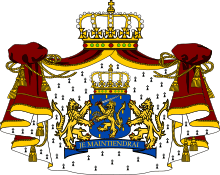Het Wilhelmus facts for kids
| English: 'William' | |
|---|---|
 |
|
| National anthem of | |
| Adopted | ~1572 1932 (officially) |
"Het Wilhelmus", also known as "Wilhelmus van Nassouwe", is the national anthem of the Netherlands. It used to be the anthem for the Netherlands Antilles too, until 1964. This song is super old! It's been around since at least the 1500s, during a big fight called the Dutch Revolt.
What makes "Het Wilhelmus" special is that its tune is the oldest among all national anthems in the world. The words are also from the 1500s. Because it's so old, no one is completely sure who wrote the music or the lyrics. However, a Dutch composer named Adrianus Valerius arranged the melody in the 1600s. It didn't officially become the national anthem of the Netherlands until the 1900s.
Contents
What is a National Anthem?
A national anthem is a special song that represents a country. It's often played at important events, like sports games or official ceremonies. Anthems usually have lyrics that talk about the country's history, its people, or its values.
The Story Behind the Song
"Het Wilhelmus" is written from the point of view of William of Orange. He was a very important leader during the Dutch Revolt. This was a long war where the Dutch fought for their freedom from Spanish rule.
William of Orange's Message
In the song, William talks about his loyalty to his homeland and his people. He explains how he had to leave his land because of his beliefs. He also asks for God's help to lead his people and fight for justice. The song shows his strong faith and his dedication to his country, even when things were tough.
Key Themes in the Lyrics
The lyrics of "Het Wilhelmus" cover several important ideas:
- Loyalty: William promises to be loyal to his country until he dies.
- Faith: He trusts in God to guide him and help him.
- Sacrifice: William mentions that he and his brothers have given everything for their people.
- Struggle: He talks about the difficulties and dangers he faced, like being forced to leave his home.
- Hope: Despite the challenges, he believes that good will come after the hard times.
The song is a powerful reminder of the Dutch struggle for independence and the role of William of Orange in that fight.
Images for kids
-
Philips of Marnix presents "Wilhelmus" to William the Silent, by Jacob Spoel (ca 1850).
-
William I, leader of the Dutch Revolt.
See also
 In Spanish: Wilhelmus para niños
In Spanish: Wilhelmus para niños
 | Stephanie Wilson |
 | Charles Bolden |
 | Ronald McNair |
 | Frederick D. Gregory |




